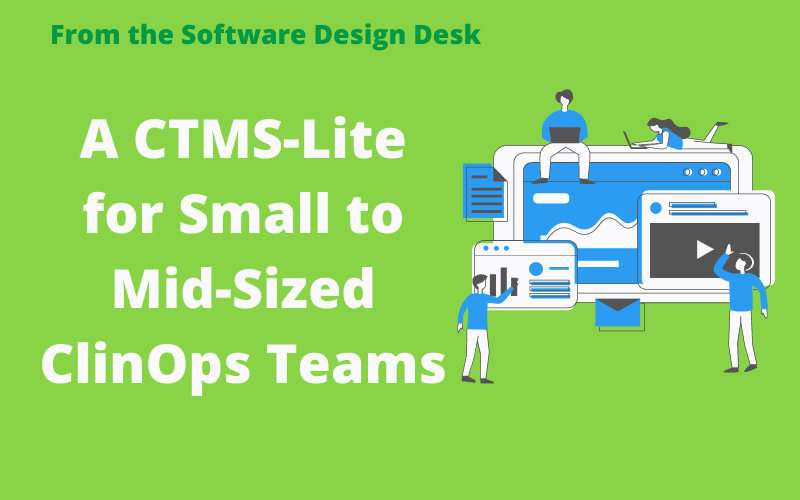There is a clear pattern in every software category: the emergence of a standard set of capabilities that comprise the very definition of the category. For example, at one point (a long, long time ago now), we all came to understand exactly what a spreadsheet application needed to do to be called a spreadsheet.
But there’s another pattern that operates in mature software categories, affectionately known as feature bloat. This is a shorthand way to refer to the fact that the VAST number of features in most mature software products do not get used…typically as much as 80%. Test this theory yourself…when was the last time you used a backsolving capability in a spreadsheet?
Feature bloat happens for obvious reasons. As a category matures, the vendors try to one-up each other with another feature that a very small number of users might need. They can then check a box that their competition cannot check and claim superiority.
What Does This Have to Do With Clinical Operations Software?
What’s my point? Don’t rush me; I am getting there.
Over the years, a standard functional definition for a Clinical Trial Management System (CTMS) has evolved. Here is what Wikipedia defines as a CTMS:
A Clinical Trial Management System (CTMS) is a software system used by biotechnology and pharmaceutical industries to manage clinical trials in clinical research. The system maintains and manages planning, performing, and reporting functions, along with participant contact information, tracking deadlines and milestones.
Today, every product in the CTMS category offers the same basic functionality – management of:
- The trial calendar and milestones,
- Critical trial documents,
- Sites, and staff,
- The trial budget,
- Management of the product inventory for the trial.
And then, the CTMS vendors add additional minor capabilities and integrations to try to creater a differentiator.
For example, if you are only managing two trials with 350 patients across 20 clinical sites, you do not need all the capabilities of a full-blown CTMS system. Instead, you probably need something like a “CTMS-lite” to replace the spreadsheets you are using to track trial activities.
Say Hello to the CTMS-Lite
What would a CTMS-lite look like? It would be MUCH less expensive, much faster to implement, and much easier to use than the current CTMS systems from legacy vendors. It would focus on key features, not every feature, and perform those features within a clean, sharp modern interface.
For the size of operation mentioned above, it’s unnecessary to have all the budget and accounting capabilities built into the CTMS. In fact, it would be more work to set up the budget and finances than would be worth it or to integrate the CTMS financial management capabilities with the organization’s general accounting system.
A small ClinOps organization also does not need the capabilities of a full-blown inventory management system. Instead, a simple system that tracks inventory shipped to sites would suffice.
There may be cases where smaller ClinOps teams do need more than a basic set of capabilities, but they do not need all the complexity, feature bloat, and cost of a full-blown CTMS system.
Agatha’s Work on a CTMS-Lite
At Agatha, we are working with some customers to identify the most important CTMS features required for smaller ClinOps teams. Using our core capabilities in document management, process management, and a complete system of workflows and notifications, we are providing a basic set of capabilities, at low cost, under a new Agatha application called Trial Tracker.
With Trial Tracker, we do not claim to provide every capability of a traditional CTMS. Instead, we provide 80% of the capabilities that clinical-stage ClinOps teams need in an easy-to-use application. And it’s working for these customers.
But how about you? What do YOU think? Reach out to me and tell me if you are struggling to manage your clinical trials without investing in a full-blow CTMS platform. Are we are onto something here? Is there is a core set of trial management capabilities that meet the needs of small to mid-sized ClinOps organizations that do not need, and cannot afford, a full-blown CTMS? I am eager to hear your thoughts, so email me at ken.lownie@agathalife.com.
And if you want to be an early user of Agatha Trial Tracker, we would love to welcome you into the group that is guiding us as we bring this product to the market. Just let me know.
Until then, remember – #ClinOpsRocks.
— KL
